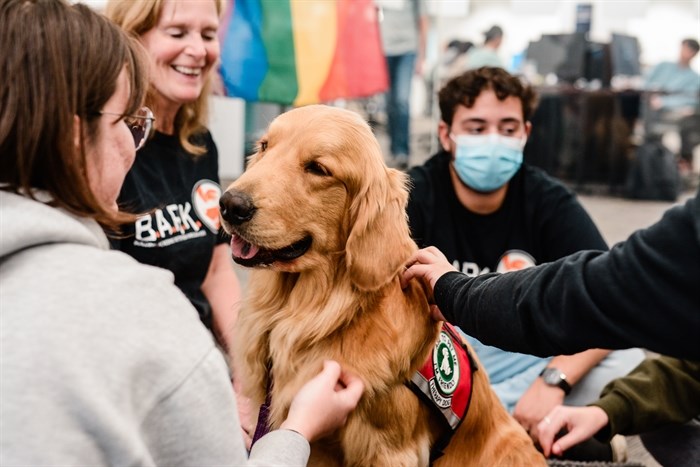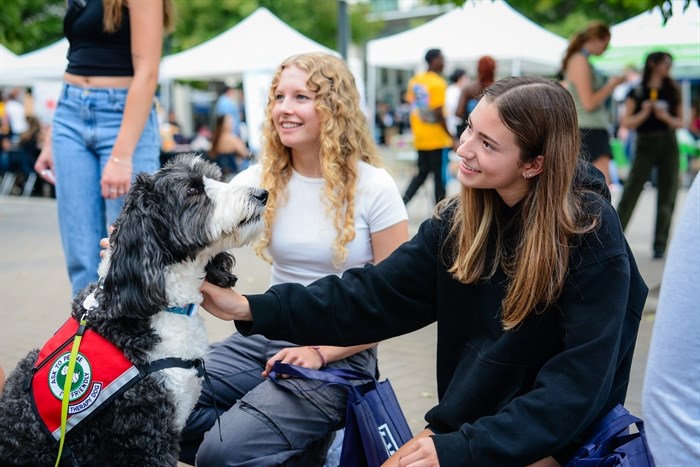
B.A.R.K. is in its 12th year of operation. The program offers dog therapy to stressed or anxious students at UBCO and is led by Dr. John-Tyler Binfet.
Image Credit: SUBMITTED/ Freya Green
October 30, 2023 - 7:00 AM
This canine therapy program not only provides effective stress relief for students, but has also proven useful to police staff and anxious blood donors.
Dr. John-Tyler Binfet is an Associate Professor in UBCO’s School of Education. He is also the Director of the university’s Building Academic Retention through K9s program. They call it BARK for short.
Binfet said he was inspired to start BARK in 2012 when walking his own dog through campus.
“I was a professor in Los Angeles, and I was a volunteer with my own therapy dog in a program for adolescents with traumatic and acquired brain injury,” Binfet told iNFOnews.ca. “And then, when I took a faculty position at UBC Okanagan, I would go from my building across campus to get coffee (with my dog), and I would just be besieged by students.”
“They'd just get lost in interacting with the dog. And then they'd look up with these tear-filled eyes, and they'd say, ‘as much as I miss my parents, I miss my dog more.’”
BARK sessions now run twice a week at UBCO, where students can pet and interact with dogs in their off time, for free. The program has been a huge success, with its 10,000th student visitor attending this past week.
Many students have expressed their gratitude for the program, Binfet said.
“We've had interesting comments over the years where they'll say, I don't make use of any other program on campus except for this one,” Binfet said.
“I hear either, I got into McGill, U of T, UBC Vancouver, and I chose here because of the dog program. I hear that all the time,” he said. “And then the other one I hear is, they'll say, Dr. Binfet, I didn't drop out only because of this dog program. They were on the cusp of leaving and somehow the dogs anchored them back into a community and said, 'you'll be okay. It'll work out.'”
Binfet said he has received a lot of interest from other universities to introduce the program in locations further afield.
In the meantime, the program has expanded quite considerably. BARK is in its sixth year of providing eight therapy dogs per week for officers and staff at the local RCMP office. Binfet said they are also in the early stages of a new initiative with Canadian Blood Services that will use dog therapy to reduce stress and anxiety in blood plasma donors.

B.A.R.K has helped 10,000 university students at University of British Columbia Okanagan, as well as RCMP staff and now blood donors too.
Image Credit: SUBMITTED/ Madisyn Szypula Photography.
The BARK squad currently has 60 dog handler teams working on its various programs and has garnered impressive results and feedback.
“We know that spending time, as little as 20 minutes, even 15 minutes, significantly reduces students' perception of stress, homesickness, and boosts their sense of connection to others on the campus community,” Binfet said.
The program is an effective “low-cost, low-barrier intervention”, Binfet said.
“It has significant outcomes for students,” he said. “And so, we really encourage students to make BARK part of their well-being regimen here. It's a way of taking care of themselves, building community and getting connected to others.”
From his research, Binfet said he noticed a staggering portion of the students engaging with the program were women. This led him to conduct his most recent study into the experience of the program for different genders.
“Upwards of 70 to 80% of the participants in all these dog studies were women. And we thought, what is happening here?” Binfet said.
Binfet and his research team recruited men, women and gender diverse individuals to participate in the study. After around 15 minutes with the dogs, Binfet said there was a distinct response amongst all the participants.
“We saw no significant differences across groups, but we saw significant pre to post-test increases in well-being, flourishing, happiness, and positive affect, and then a corresponding decrease in stress, loneliness, and anxiety,” he said.
The dogs chosen to be part of the program must go through a rigorous evaluation process before they are allowed in.
“We just finished assessing 44 dogs, and I think nine of them have made it through the assessment,” Binfet said. “We do our own assessment here. We're unique… The whole BARK team votes on every dog and every handler.”
The assessment is so rigorous, that sometimes a dog will be approved and their handler won’t, Binfet said.
“We put them through a whole rigorous full semester evaluation where they do an internship, and they have to demonstrate a number of behaviours,” he said. “And we're really looking for, not robotic dogs that are void of personality, but ones that really will enjoy working with the public and connecting with students.”
A team of 30 students and staff vote on every dog and handler applicant, Binfet said.
“The two times that I overrode, and I said, 'oh, no, no, they're good' it came back to sort of bite me,” he said. “So I'm very, very respectful of the voice of the students.”
The team is made up of a number of breeds. Binfet himself is a staunch proponent of rescue animals in particular, and so the organization works with a local Kelowna dog charity, Paws It Forward, to include rescue animals in the program.
“I'm a rescue guy and have four rescues,” Binfet said. “So, we have a lot of Paws It Forward dogs in there. But we also have a lot of golden retrievers and golden labs and golden doodles. These are really solid dogs.... But we're open to all kinds of dogs.”
Student attendees generally like to see dog breeds that resemble their family pets, Binfet said.
“It's funny, when the students come to the lab, and there might be 15 dogs working at any given time, they tend to go to… the dog that reminds them of their childhood. And so you'll have this big jacked athlete guy come and he'll go to the little Yorkie. And it's so cute,” Binfet said. “They tend to go for their childhood dog and that is so lovely to see.”
The organization is supported by student support services at UBCO. Binfet said he finds the support of the university progressive and sees his work as not only beneficial for students, but rewarding for himself as well.
“You know, I work in the area of kindness, generally as a psychologist,” he said. “And so, my day is either is asking kids about kindness, or it's covered in dog hair from working in the BARK program. It's a good gig.”
More information about the work B.A.R.K does can be found on their website here.
To contact a reporter for this story, email Georgina Whitehouse or call 250-864-7494 or email the editor. You can also submit photos, videos or news tips to the newsroom and be entered to win a monthly prize draw.
We welcome your comments and opinions on our stories but play nice. We won't censor or delete comments unless they contain off-topic statements or links, unnecessary vulgarity, false facts, spam or obviously fake profiles. If you have any concerns about what you see in comments, email the editor in the link above. SUBSCRIBE to our awesome newsletter here.
News from © iNFOnews, 2023